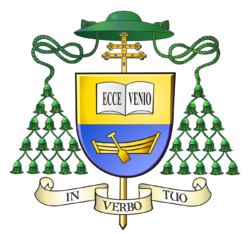Henryk Józef Muszyński (born 20 March 1933 in Kościerzyna, Kashubia) is the Primate Emeritus of Poland and former archbishop of Gniezno, Poland, having been appointed by Pope John Paul II when the Polish hierarchy was reorganized in March 1992. He had previously been Bishop of Włocławek since 1987.
His Excellency Henryk Muszyński | |
|---|---|
| Archbishop Emeritus of Gniezno Primate Emeritus of Poland | |
 | |
| Church | Roman Catholic |
| Archdiocese | Gniezno |
| Diocese | Gniezno |
| Predecessor | Józef Glemp |
| Successor | Józef Kowalczyk |
| Personal details | |
| Born | 20 March 1933 |
| Nationality | Polish |
| Motto | In Verbo Tuo (At Thy word) |

Life
editHe is known for his Biblical studies, especially concerning the Qumran manuscripts.[1]
He has been described as "an advocate of open and tolerant Catholicism".[1]
Together with Danuta Hubner and Tadeusz Pieronek, Muszyński coauthored a reflection on the integration of Polish Christianity into the European Union.[2] This reflection persuaded many Polish rectors to become proponents of Poland's accession to the European Union in 2004.
Historically, the Archbishop of Gniezno served simultaneously as the Primate of Poland. But when the reorganization of the Polish Church's ecclesiastical structure severed the See from Warsaw, an exception was made to continue the long-standing tradition until the retirement of the Archbishop of Warsaw, who had previously been Archbishop of both cities. On 1 November 2006 Pope Benedict XVI sent a letter to Józef Glemp confirming that Cardinal Glemp would be the Primate of Poland until 18 December 2009, his 80th birthday.[3]
According to controversial records saved in Instytut Pamięci Narodowej, since 1985 to 1989 Henryk Muszyński was registered as secret collaborator of communist Służba Bezpieczeństwa, however he did not agree to this and not even know about that fact, and that his superiors where informed about all talks with communist authorities. Muszyński expressed regret that he could not refuse such talks.[4]
Archbishop Muszynski has sought to constantly improve relations with Jews and Germans.[1][5] In 1999, he received the Buber-Rosenzweig-Medal for his contributions to Christian–Jewish understanding. He was praised by Pope Benedict XVI for doing this in 2005.[citation needed]
See also
editReferences
edit- ^ a b c Adam Michnik; Agnieszka Marczyk (28 November 2017). Against Anti-Semitism: An Anthology of Twentieth-Century Polish Writings. Oxford University Press. p. 289. ISBN 978-0-19-062452-1.
- ^ Komecki, Grzegorz (2004), Kościół katolicki w Polsce wobec integracji z Unią Europejską, nakł. Uniwersytetu Marii Curie-Skłodowskiej, retrieved 2020-03-26
- ^ Letter of Pope Benedict XVI to Primate of Poland Józef card. Glemp, in: L’Osservatore Romano 1 (2007), p. 61
- ^ Czaczkowska, Ewa K. (14 October 2008). "Abp Muszyński: zostałem zarejestrowany jako TW". Rzeczposolita (in Polish). Retrieved 2020-03-26.
- ^ Burnetko, Jarosław Makowski, Krzysztof (2009-01-03). "Dobry kandydat, ale...: Abp Henryk Muszyński". www.polityka.pl (in Polish). Retrieved 2020-03-26.
{{cite web}}: CS1 maint: multiple names: authors list (link)
External links
edit- Virtual tour Gniezno Cathedral Archived 2020-07-17 at the Wayback Machine
- List of Primates of Poland